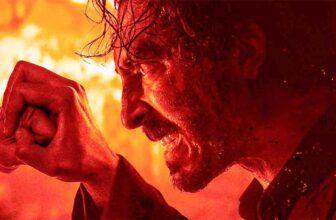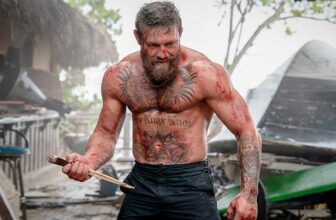
An all-star cast feature in this historical action film revolving around a plot to assassinate Sun Yat-sen, founder of the Republic of China, as he makes his way through the streets of Hong Kong. Featuring Donnie Yen, Wang Xueqi, Tony Leung Ka-fai, Nicholas Tse, Hu Jun, Eric Tsang, Simon Yam, Fan Bingbing, Zhou Yun and Leon Lai, written and directed by Teddy Chen.
Trailer
Cast
This movie features an impressive cast list of established and current Asian talent.
Headlining is action superstar Donnie Yen as “Shen Chongyang”, a humble policeman addicted to gambling who is persuaded to join the bodyguards.
“Reign of Assassins” star Wang Xueqi plays “Li Yutang” a businessman who provides financial support for the revolutionaries and rallies a group of bodyguards to protect Sun Wen (Sun Yat-sen). “Ashes of Time” star Tony Leung Ka-fai is “Chen Shaobai”, a real life character who was a supporter of Sun Yat-sen and the revolutionaries. He established the China Daily newspaper in Hong Kong to increase support for the revolutionary cause.
One of Asia’s most popular actresses, Fan Bingbing stars as “Yueru”, Li Yutang’s fourth wife and Shen Chongyang’s ex-wife. She has appeared in the movies “Flash Point“, “Shaolin” and “X-Men: Days of Future Past”. Pop star and actor Nicholas Tse stars as “Deng Sidi/Si”, a rickshaw puller who faithfully serves the Li family. Tse is one of the “new generation” of Hong Kong action stars and has appeared in “Gen-X Cops”, “Dragon Tiger Gate”, “New Police Story”, “Invisible Target” and “Shaolin”.
Former stuntman and popular actor Eric Tsang is “Police Chief Smith”, whose loyalties are torn between his British superiors and fellow Chinese citizens. Tsang has had a prolific career from the early 1970’s to the present day, and has appeared in the “Lucky Stars” series of films, “Gen-X Cops”, “Hitman” and “Infernal Affairs”.
Cantopop superstar Leon Lai plays “Liu Yubai”, a beggar who came from a rich family. He is highly skilled in martial arts and fights with an iron fan. Veteran star Simon Yam plays “Fang Tian”, a former general living in exile in Hong Kong. He and his men disguise themselves as a Peking opera troupe. Yam has appeared to great acclaim in dozens of films, including “Ip Man“, “SPL/Kill Zone”, “Bullet in the Head”, “Full Contact”, “Election”, and many, many more.
Making her acting debut is Chinese singer Li Yuchun as “Fang Hong”, Fang Tian’s daughter. Proficient in martial arts she decides to join the bodyguards. Taiwanese actor Wang Po-chieh is “Li Chongguang”, Li Yutang’s 17-year-old and only son. He goes against his father’s will to show his fervent support for the revolution. Wang appeared as Emperor Liu Xie in Donnie Yen’s “The Lost Bladesman“.
Dramatic actor Hu Jun stars as “Yan Xiaoguo”, the assassin leader who was formerly a student of Chen Shaobai. He is fiercely loyal to the Qing government. Hu has appeared in “Assembly”, “Red Cliff” and “Mulan”.
Giant 6′ 10 ¾ ” former NBA basketball star, Mengke Bateer plays “Wang Fuming”, an outcast monk from the Southern Shaolin Monastery who became a tofu vendor. Chinese actor Zhang Hanyu stars as “Sun Wen/Sun Yat-sen”, leader of the revolutionaries. He arrives in Hong Kong for a secret meeting to discuss plans for a revolution in China. Zhang hit the big time after his lead role in “Assembly” and appeared in Donnie Yen’s “Special I.D.“.
Also making appearances are MMA/UFC star “Cung Le”, veteran star John Shum, singer Jacky Cheung, and martial arts actors Xing Yu, Dennis To and Philip Ng.
Plot
Dr. Sun Yat-sen (Sun Wen), a revolutionary leader who is behind the movement to bring democracy to China, has been in exile in Tokyo for a number of years. China’s ruling Qing Dynasty want him dead at all costs to quash any ideas of an uprising against them.
In October 1906, Sun Wen makes plans to visit the British-controlled colony of Hong Kong, under the premise of seeing his ailing mother. In reality, he is there to discuss his campaign with fellow Tongmenghui revolutionary members to overthrow the corrupt and crumbling Qing dynasty in China. Upon learning these plans, the Qing Empress Dowager Cixi sends a group of assassins, led by Yan Xiaoguo, to kill Sun.
Revolutionary Chen Shaobai arrives in Hong Kong a few days before Sun’s arrival, to meet Li Yutang, a businessman who provides financial aid for the rebel’s cause. As Sun Wen’s arrival draws near, Li rallies a group of patriotic believers to serve as bodyguards for Sun Wen when he arrives. As Sun Wen makes his way through the streets of Hong Kong, the bodyguards and assassins fight for the political future of the Chinese people.
Action
The story begins on 10th January 1901 with a depiction of the real-life assassination of revolutionary leader and English teacher Yeung Ku-wan. Shot and killed by a Qing agent, it ignites a slow-burning fuse to a powder-keg of action.
Our first taste of martial arts action comes with an attack on Simon Yam’s Opera Troupe. Abseiling from a theatre ceiling whilst throwing acid over their opponents, the Qing assassins waste no time in their brutal assault on Yam’s men. The assassins are armed with poles, tipped with vicious barbed spikes and hooks on chains. It’s a rare treat to see Yam using a traditional broadsword as he fights with three assassins led by “Wrath of Vajra” star Xing Yu. Rather like the kung fu films of old, a lot of blood sprays about, but being a product of the 21st century, it is represented digitally.
Our first glimpse of Donnie Yen in fight-mode is actually a very brief and savagely realistic beating he gives to a Qing agent in a darkened alley with his bare hands.
The action really kicks off in the last third of the film as a convoy of rickshaws surrounded by the bodyguards makes its way through the crowded streets of Hong Kong. Dozens of assassins appear from upper floor windows and roofs, armed with crossbows. Former NBA star, Mengke Bateer uses his basketball skills to launch water melons at the attackers, as the convoy weaves and dodges a hailstorm of arrows. Li Yuchun is no shrinking violet as she takes out one of the crossbow snipers using traditional kung fu strikes, whilst Donnie Yen punches and kicks his way across the balconies above the streets.
The convoy is diverted into a street lion dance, which is cover for an ambush by the assassins. Nicholas Tse uses his rickshaw as a weapon, whilst Li Yuchun faces Xing Yu. She gets her chance to shine as she heroically fights off Xing Yu’s team of assassins whilst he prepares an explosive booby trap.
One of the highlights of the film arrives when MMA star Cung Le bulldozes his way through the crowds to attack Donnie Yen. Although some wirework is used, Cung Le’s powerful blows still look convincing. There is some nifty free-running incorporated as Cung Le pursues Donnie through the busy market stalls. The choreography moves at a blistering pace and incorporates all ranges of techniques from jumping kicks through to grapples and throws.
As the tension mounts and the action begins to crescendo, Leon Lai holds off dozens of assassins using his metal fan as a weapon. There is quite a bit of wirework that is captured with dizzying camerawork, as Lai navigates a stone staircase dispatching assassins all the while. When Hu Jun arrives on the scene, we are left in no doubt as to who is the most skilled and deadly of the assassins, as he strives to stop the bodyguards once and for all.
Summary
“Bodyguards and Assassins” is first and foremost a period drama. The story takes place over four days, with the first three days, nearly two-thirds of the film, mostly concentrating on the characters and drama. It takes nearly an hour and twenty minutes before the action kicks off properly. This introduction could perhaps have been shorter, but the audience do get to know the various characters and their motives, so when they are in danger or even killed, there is a much greater emotional bond and resonance. The final forty minutes or so covering the fourth day, is tense and thrilling in equal measure whilst peppered throughout with action. The build up is accompanied by an excellent musical score by Chan Kwong-wing and Peter Kam, making the tension almost palpable.
Although Donnie Yen has top billing, his part is not much more than a guest-starring role. His emotional scenes are very good, and his fight scene with Cung Le is one of the film’s highlights. I can’t fault any of the main performances, and Wang Xueqi’s superb turn quite rightly won him many Best Actor awards and nominations. The sets and production values are of the highest quality. I don’t think turn-of-the-century Hong Kong has ever been so faithfully re-produced.
It is quite surprising to have such a strong message wishing for a better and more democratic China, in a Chinese co-production. A lot of similarly-themed Chinese films can be very preachy and melodramatic. This never feels like that due to the combination of great performances, a good script, and glossy direction.
Overall this is an extremely polished and well-acted political-history-drama film, and if you are patient, also delivers some decent action in it’s final act.
Trivia
- From early pre-production to realisation, approximately eight years were spent designing and subsequently building the huge, authentic period street sets of Hong Kong’s central district. Oscar-winning director Danny Boyle was extremely impressed by the attention to detail when he visited the set.
- The writer and director of “Bodyguards and Assassins”, Teddy Chen, reunited with Donnie Yen in 2014 for “Kung Fu Killer“.
- “Bodyguards and Assassins” won multiple film awards including: 4th Asian Film Awards – Best Actor Wang Xueqi, Best Supporting Actor Nicholas Tse; 29th Hong Kong Film Awards – Best Film, Best Director, Best Supporting Actor Nicholas Tse, Best Cinematography Arthur Wong, Best Action Choreography Stephen Tung, Lee Tat-chiu, Best Original Film Score Chan Kwong-wing, Peter Kam; 16th Hong Kong Film Critics Society Awards – Film of Merit, Best Actor Wang Xueqi; 47th Golden Horse Awards – Best Costume Make Up Design Dora Ng.
- In real life, the Tongmenghui, also known as the Chinese United League, United League, Chinese Revolutionary Alliance, Chinese Alliance and United Allegiance Society, was a secret society and underground resistance movement founded by Sun Yat-sen, Song Jiaoren, and others in Tokyo, Japan, on 20th August 1905.
- The events in this film are entirely fictional. The real Sun Yat-sen actually spent most of his time abroad in exile raising support and funds for the revolution.






